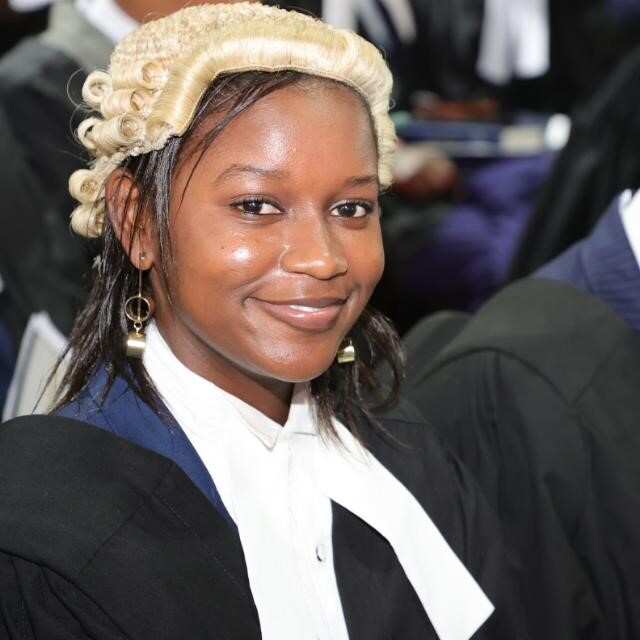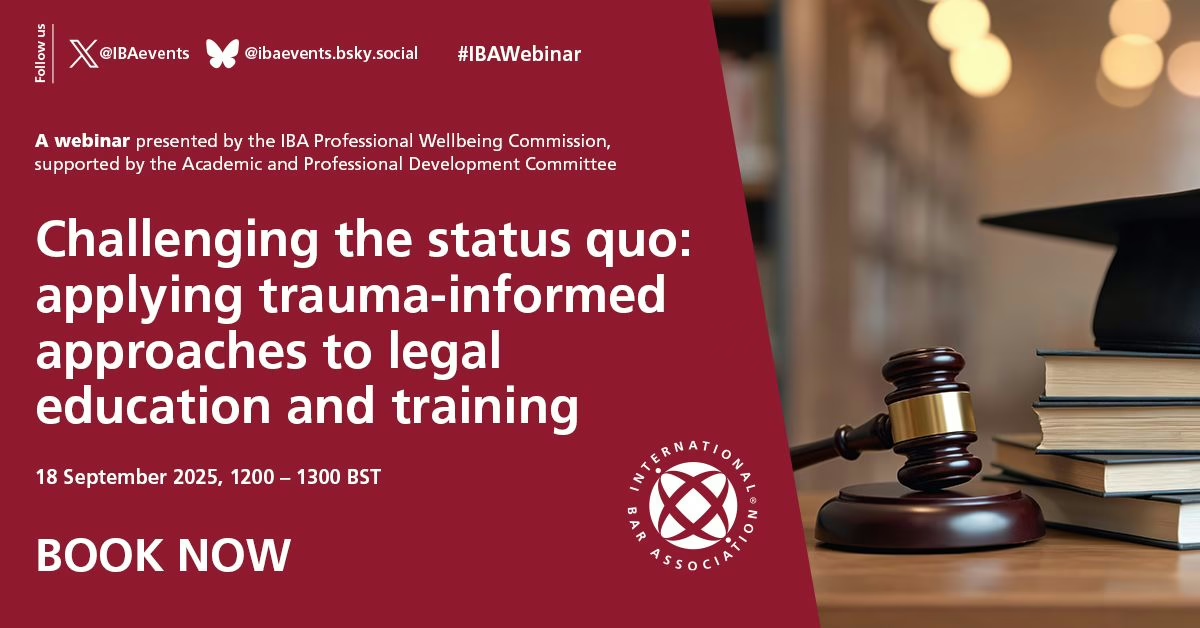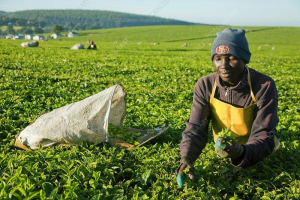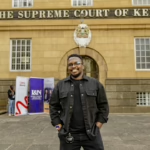Despite Kenya being well known for sports globally, sports law remains to be a choice of a select few. Corporate Juror recently interviewed Caroline Mwanzia who won the Rising Star Award by Women In sports law. WISLAW an International Organization that comprises women who are in sports law either in the capacity of advocates or students. WISLAW awards some of its members yearly based on their achievements, in five categories.
Tell us about your journey
Truthfully, I have always been an active child. I was the kid that always played too much in the field and at the same time excelled in exams. I worked hard and played hard too. I was that child who would go back home with a ripped uniform because I lost the buttons or my school badge got torn because I played too much or I misplaced my sweater, umbrella, pen, while playing in the field. Most of all, I loved football and athletics. I was not professionally involved in the two sports though, but I used to enjoy the inter-class competitions and the regional competitions because we were all allowed to watch and cheer from the bleachers.
High school was pretty much the same. I loved cross-country-again, not as a participant because I did not like that part, but as a spectator-because these moments were a good sight for sore eyes. The passion in the runners and the beauty in winning was just on another level for me. Still, throughout primary and high school, I had not yet tapped on the part of me that was going to become what I am today and what I still am becoming. If anything, I really wanted to be a cardiologist and that was a hill I was willing to die on[then]. Well, I never joined Med School. Instead, I went to Kenyatta University School of Law (KUSOL) Parklands between September 2015 to April 2019. Afterwards I joined Kenya School of Law and finished successfully, in July 2021.
Why sports law
To be fair, law school was hard but with great friendship and a decent level of focus it was possible to hack it. During my first year, I wanted to become a criminal lawyer. I fancied the area of practice and figured I would fit well in the fight for a proper criminal justice system. However, I had always loved sports since I was a young girl. Football was my to-go game, even though I was terrible at it. All I did was run with the ball and kick it as far as it could go. Do you believe in love at first sight? Well, let me make you a believer. One sunny day, while at the KUSOL library, on a quest for knowledge, I stumbled upon this blue book titled, ‘Modern sports law’. I was stunned because I never thought there was a branch of law known as sports law or in legal terms, Lex Sportiva. I grabbed the book and started flipping the pages skimming through just to see what the book was about and from that day, I never put that book down. At the time, it was the only sports law book in a pile of other books that were not sports law related.
When I was in fourth year, many of my peers thought that I was rather daring by undertaking my dissertation in a field that was so unpopular in the school at the time. I mean where would I get the resources? Well, I used to go all the way to main campus to get other books on sports law; KUSOL library, sports law books were about three to four at the time and for an entire dissertation to be convincing I definitely needed more books.
As fate would have it, my passion in sports law was intrigued by that lonely lost blue book in second year. It was then that I decided to be a sports lawyer and never looked back. Out with criminal law, in with sports law. I tried my best to find out more about sports law but it was just not forthcoming, especially from Kenya. sports law was not taught at KUSOL as a legal unit. Hence, to get more information about it was a bit hard. In 2018 when in third year, I began making applications abroad for Masters in sports law because I knew that was the only way I could get more information. None of the schools responded positively. In a bid to know more about sports law, I did my attachment at the Sport Disputes Tribunal and after I completed university, I interned at the Anti-doping Agency of Kenya and these two places have had a huge contribution in enabling my passion to grow even better. I was able to understand sports law and how to apply it and I realized how broad it was. From player contracts to sports agencies to doping in sport and intellectual property. I had landed on blue waters. Since then, I have attained education on sports law from FIFA where I learnt about Doping in Football, The Academy of Leadership Sciences Switzerland where I learnt about sports law and its application in South Africa and Europe and beginning next year, I will undertake my Masters in Sports Management and Legal Skills from ISDE Barcelona. One can never stop learning!
What notable work have you done in this space
Just beginning this journey in sports law for me is something worth noting because sports law is still a new area in Kenya and there are others in this field but we are still scarce. However, one notable work I have done was coming up with a project aimed at introducing anti-doping education among medical practitioners in Kenya together with a critical review on the laws governing medical practitioners. I came up with this idea while I was interning at the Anti-doping Agency of Kenya between April and July 2019.
It was not until last year that the project was able to take off. With tremendous support from the Agency, I, together with a very able team, collected quantitative data from various medical practitioners (Doctors, nurses, pharmacists, medicine students, etc.) from different counties. The responses we got was a clear indication that the education and awareness among medical practitioners is in fact needful. Once the data collection was done, I gave a report specifically on the legal side of the project where I analyzed the lacunas present in the laws that govern medical practitioners and why they need to be amended so as to include anti-doping. All this was to ensure that medical practitioners are well guided by the law when it comes to doping violations.
Certainly, the same is still at its implementation stage and in the fullness of time, once the mission of the project is attained, it will be a great start on our country’s journey towards the fight against doping and the promotion of clean sport.
What is WISLAW and how did you join?
WISLAW is an abbreviation for Women In sports law, an International Organization that comprises women who are in sports law either in the capacity of advocates or students. As long as one has an interest in sports law, they are eligible to be a member.
I joined WISLAW last year through a friend I met while undertaking the FIFA class on anti-doping in football. She is a member of WISLAW and through that she informed me about the organization and how much it would enable me to meet other ladies with the same interest. Thus, within no time, I also was able to join.
WISLAW awards some of its members yearly based on their achievements. Their awards cover five categories: In-House Counsel of the year Award, Arbitrator of the year Award, Lawyer of the year Award, WISLAW award and Rising Star Award. The awards are given to two members in each category during the WISLAW General Assembly. Nominations for each category are done by members and once a list of nominees is made, voting begins. I was able to be nominated and eventually I got the award. I am a Rising Star Award Winner!
What does this achievement mean to you?
This achievement has shown me that I can become anything I put my mind to. Other than being nominated, I also nominated myself when member nominations were opened because I am my biggest cheerleader and fan. Go Caroline! I believe in myself and in what I am doing in this journey and self-nominating was a clear indication of that. Getting the award is the first of many other great achievements to come and I am here for it. Godspeed!
What should other female lawyers do to get into this organization?
All one needs to have is the passion for sports law. Being an organization founded on sports law, that is the main requirement. Besides passion, one needs to always try their best to be up-to-date with sports news and updates, being thirsty for knowledge concerning sports and anything sports-related. This will enable one to come up with ways in which they can contribute to the development of sports and sports law. Additionally, one should ensure that they attempt to understand and know the sports development of other countries beyond Kenya as well as connecting with people who have grown in the field and would be of great help in holding their hands in this field. All these are important for one to not just be a part of an organization but also to be a good sports lawyer.
What in your opinion is the future of sports law and Women’s role therein?
The future of sports law is promising. This area of law is significantly unexplored by many. The more lawyers tap into it, the better it will become. Ideas and opinions on matters of sports are very important because sports are a huge economically fertile zone for any nation. Legal matters of sports are plentiful and need professional personnel to handle them with integrity and discipline. I look forward to meeting more stakeholders and tabling all the ideas I have concerning the manner in which we can make sports law accessible for every interested person. Especially women.
Women’s role in sports law is fundamental because it has always been felt that sports is a man’s world. I hope for a possibility where women will be more drawn towards sports law in the near future so as to encourage the young girls who are afraid of leaving their footsteps in a field that is largely dominated by men. I hope the ratio of men to women in sports law will be so close that there won’t be a need to encourage more women to come forth.



















